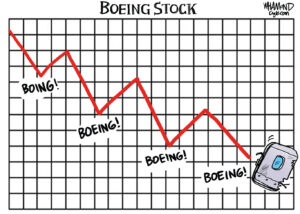The Pentagon Is Quietly Enlisting Its Officers in Corporate America
A new report exposes a largely unknown fellowship that gives major arms companies outsized influence in defense policy. Image: Adobe
Image: Adobe
The government should do more business with McKinsey & Co. — one of the world’s largest consulting firms — says a Pentagon presentation: “Leverage [the] consulting firm’s expertise and objectivity – outsourcing is a positive action.” While this might sound like a talking point from lobbyists, it actually came from an active-duty naval commander who spent almost a full year working at McKinsey & Co. with you, the taxpayer, footing the bill.
It’s no secret that major defense companies spend millions to influence the U.S. government in hopes of securing contracts, favorable treatment, and higher profits. What’s less known is that the military has a program that subsidizes these efforts. A new Quincy Institute report I co-authored with Ben Freeman, director of QI’s Democratizing Foreign Policy program, provides the first ever in-depth look into a Pentagon program that gives big businesses a unique avenue for influencing senior military policymakers.
Each year, the Pentagon sends military officers to work for major corporations through the Secretary of Defense Executive Fellows (SDEF) program. The intention is for fellows to gather insights about how these companies are organized and then present their findings to high-ranking military officials, along with recommendations for reforms that the military should consider. In practice, however, the reforms suggested to the Pentagon represent a free opportunity for the large contractors hosting fellows to push the government towards adopting corporate-friendly policies.
Each year, the Pentagon sends military officers to work for major corporations through the Secretary of Defense Executive Fellows (SDEF) program.
Since its creation in 1995, the largest beneficiaries of the SDEF program have been some of the nation’s largest defense contractors, including Lockheed Martin, RTX (formerly Raytheon), and Boeing. These companies receive nearly a free year of labor from their military fellows, direct insight into the activities of both the government and their competitors, and a unique method through which they can push self-interested suggestions upon their largest customer: the Department of Defense (DOD).
It is no coincidence that many of these suggestions are proposals that would benefit companies involved in the program.
SDEF recommendations to the government are packed full of glaring conflicts of interest. For example, the contractor-dominated program advised the Pentagon to hire more contractors, subsidize them directly, reduce oversight and transparency, and give contractors more political power so that they can “Help craft National Security Strategy.”
We documented numerous examples of fellows making policy recommendations that would specifically benefit the company they worked for. Fellows at companies who export billions in weapons each year called for the government to loosen arms trade regulations. A fellow at a railroad company suggested that the DOD consider using railroads more, a fellow at a machinery rental company suggested the DOD rent more machinery, and a fellow at a private utility suggested the DOD continue buying energy from private utilities. In perhaps the most glaring example, one fellow had company officials craft some of his recommendations, including suggestions to modify outsourcing rules and make it easier for the firm to work with DOD. That firm was Enron, and the recommendations were made just six months before the company imploded.
Many of the participating companies have not been shy about using the program to advance their agendas with the government. At least 18 companies participating in the SDEF program have assigned their fellows to work in public sector contracting and “government relations” positions, essentially using them to develop closer relationships with the military. One fellow at a biopharmaceutical company was assigned the task of “Exploiting DoD value from [the] biotech sector;” naturally, they recommended that the DOD invest more in biotech.
The effects of the program do not end here; it also appears to encourage a revolving door between industry and government. Looking at a large sample of former SDEF fellows, we found that 43% have worked for a government contractor since leaving the program. Comparing this sample to a study of all Pentagon officials done by the Government Accountability Office, former SDEF fellows appear to pass through the revolving door to work for large government contractors at more than twice the rate of other DOD personnel.
Revolving door practices threaten the integrity of the government by creating an open invitation for corruption and unethical behavior.
In some cases, fellows even go on to work for the exact same companies where they had been assigned, essentially using this government program as a launching pad for a lucrative career in the private sector.
Revolving door practices threaten the integrity of the government by creating an open invitation for corruption and unethical behavior. Still, the SDEF program shows no signs of recognizing this as a problem. In fact, the SDEF once advised that it should be easier for military officials to pass back and forth between the military and private industry, despite the tremendous accountability problems such a reform would produce.
The SDEF program is based on the idea that national interests and corporate interests are closely aligned. It aims to, according to an SDEF PowerPoint presentation, “Treat corporate sponsors as potential extensions to the [national] security apparatus,” arguing that powerful companies help to create a “safe and secure world.” They therefore believe that the military should not only partner with industry, but should actively “promote industry.”
Yet the behavior of the companies participating in the SDEF program makes it clear that the national interest often takes a back seat to the firm’s interests, namely its profits. When given the opportunity, firms will push for policy reforms that have little to do with an effective defense strategy, but everything to do with their bottom line. Allowing big businesses such a privileged opportunity to influence military policymakers serves to benefit shareholders and executives, not the American people.
The DOD should reconsider the SDEF program as it currently exists, either by reforming the way it functions, downsizing it, or eliminating it entirely. Until then, it will continue to serve as a corporate handout and a tool for the military-industrial complex to maintain its grip on U.S. defense policy.
The director of the SDEF program did not respond to multiple requests for comment.
Your support matters…Independent journalism is under threat and overshadowed by heavily funded mainstream media.
You can help level the playing field. Become a member.
Your tax-deductible contribution keeps us digging beneath the headlines to give you thought-provoking, investigative reporting and analysis that unearths what's really happening- without compromise.
Give today to support our courageous, independent journalists.






You need to be a supporter to comment.
There are currently no responses to this article.
Be the first to respond.